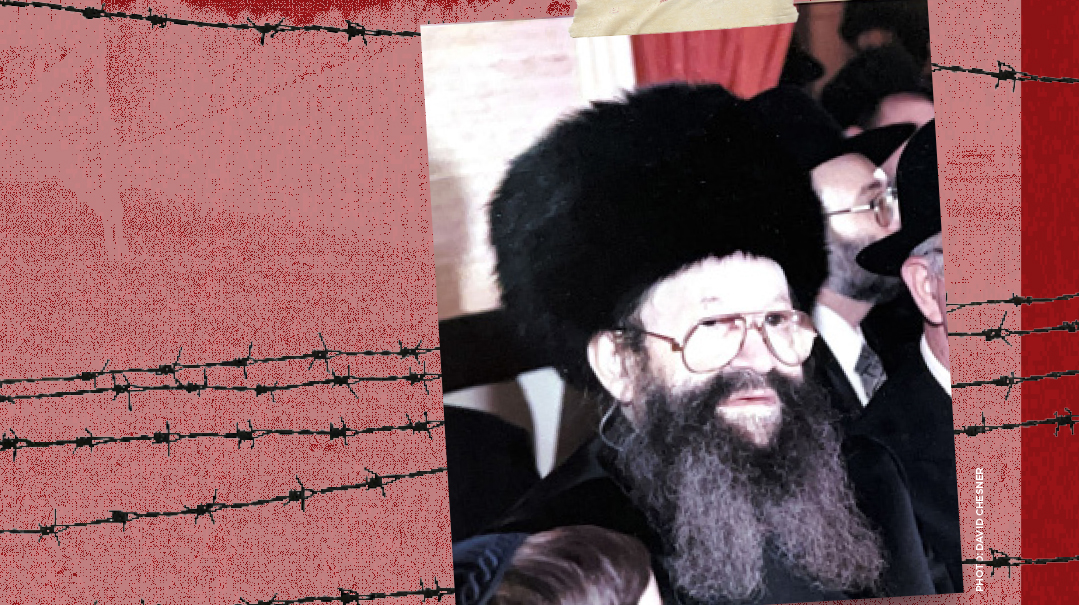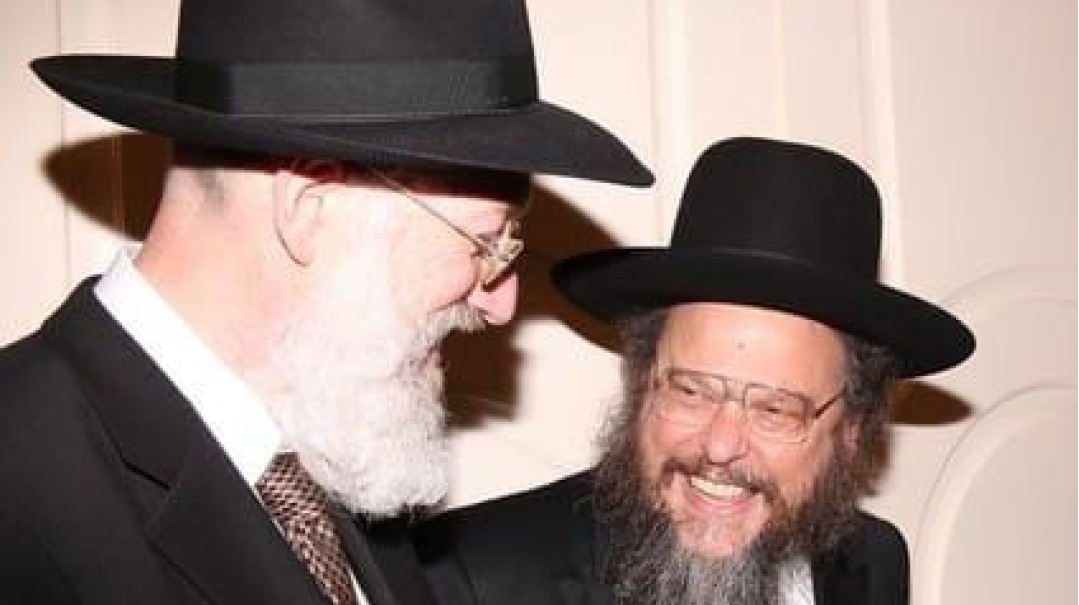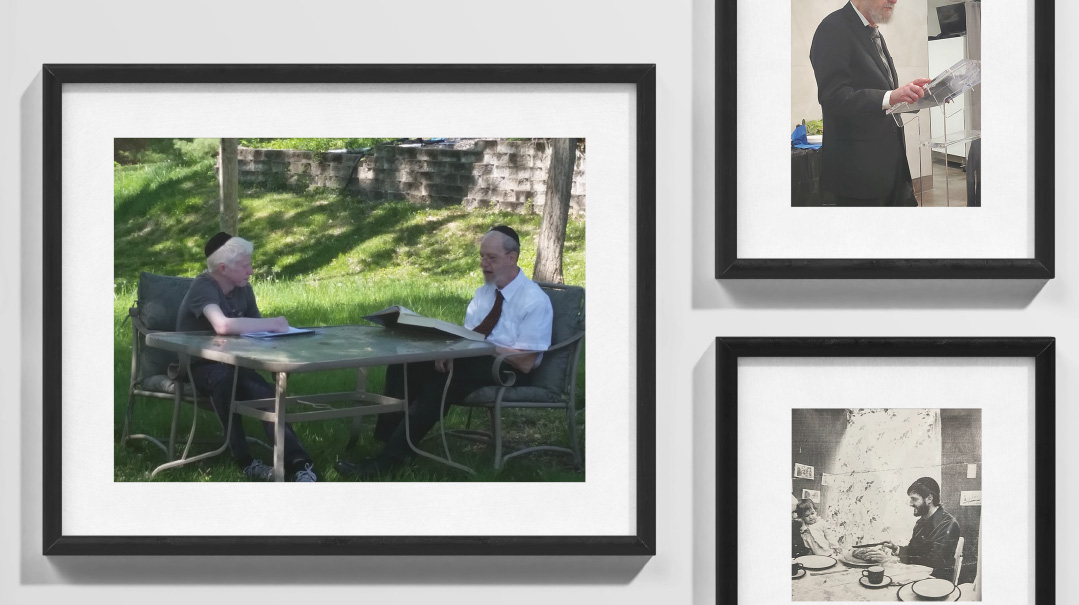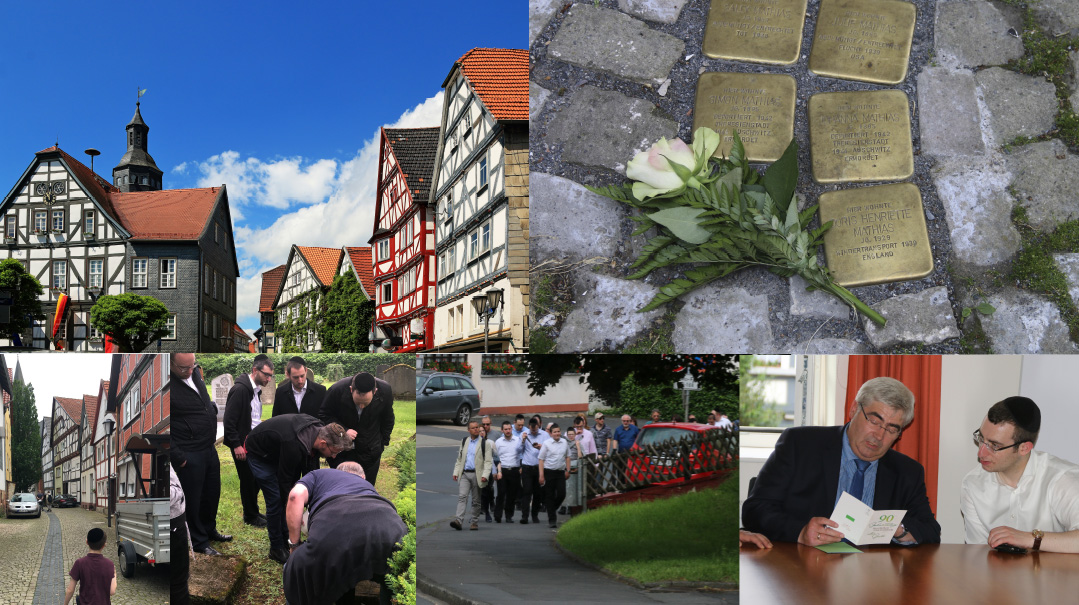I Want to Live
| July 22, 2025A series of miracles and unbending emunah brings a teenage boy to defy the Nazis and discover his own inner core of G-dliness

PHOTO: DAVID CHESNER
All he wanted was to survive, yet Yeedle Baum was a hunted animal at the hands of the Nazis. One miracle after another, somehow the war was over. When he raised the blue and white flag over Haifa harbor, he knew he had to be worthy of G-d’s grace
Tomashov-Masovietzki, 1932
“Yeedle, please eat a spoon of farina,” his mother coaxes the reluctant child. “Remember, Tatte said he’ll give you a prize if you finish your plate.” Yeedle, a frail, scrawny seven-year-old, knows very well the power he wields by agreeing to swallow a portion of food.
“If I eat, will you let me ride in my carriage?” His mother hides a smile. “Certainly, I’ll instruct Jan to take you on a long, long ride, all the way past the mill.” She knows how her youngest son loves to ride in his child-size pony carriage, following the track that leads through the town and then along to the river, all the way past the family’s flour mill. Yeedle leans forward, his mouth open wide, and his mother sighs in relief.
1939
Yeedle has grown. He’s already 14, and of age to go away to yeshivah. But his older sisters are still fretting and fussing over him — how will he manage so far from home all on his own? What kind of food will they feed him there? What kind of mattress will he sleep on? Will there be enough heat through the cold winter nights? Yeedle protests. After all, he tells them, he’s not a baby anymore. Yet in his heart, he’s not so sure — will he really manage without the comforts he’s accustomed to? But before he can prove himself, everything changes. Germany declares war and Poland is overrun by the Nazis before the Yamim Tovim are out.
Yeedle walks quickly through the streets of Tomashov. He is out on an errand but knows that Mama worries every moment he is gone. And Yeedle worries as well, for there is danger in the mostly-deserted streets since the Germans have come, and he prefers to be behind the locked door and shuttered windows of his childhood home where he can still pretend he’s safe. All of a sudden, the silence is broken by the roar of an engine that powers a truck full of jeering soldiers that is almost upon him before he can duck away. The truck brakes, and the soldiers order him on. Before Yeedle knows what’s happening, they drive off with him, through the streets and out of the town, and he wonders if he’ll ever see his family again. They are so jolly, these soldiers of the Reich, laughing at their own jokes as they poke fun at Yeedle’s peyos and chassidic garb.
“Hey Jew!” Yeedle looks up. “If you shout out that the Jews are to blame for the war, we will set you free.” A round of cheers and applause. What an amusing proposal! The soldier who has spoken beams at his own cleverness. “What do you say? Do you want to be freed, huh?”
Of course he wants to be free. Yeedle longs to be released from this nightmare and run like the wind back to his family, but… he refuses to indict his fellow Jews. Not for anything in the world will he malign his people — not even his life.
“I am to blame for the war!” he yells over the noise of the engine. “I am to blame for the war!” he screams out to the air, to the swooping birds, to the black clouds gathered overhead.
The soldiers howl with laughter, the loose loud laugh of men who have tasted victory — it’s a good joke, after all. And they stop the truck and let him go.
Piotrkow 1941
The Jewish community of Tomashov has been interned in the Piotrkow ghetto and the able-bodied have been put to work in nearby factories. It’s been a long day at the glassworks for Yeedle and his friend Naftali, oldest son of Piotrkow’s Rav Moshe Chaim Lau, and they are exhausted after a day’s forced labor. But even so, they move quickly along the familiar route back home to the ghetto, anxious as to how their families have fared through another unpredictable day.
The sounds reach their ears first, and they slow their steps. They must be careful not to walk right into trouble. One foot in front of the other and then they turn a corner and the sounds merge with the sight of a world gone mad. There, far ahead but still clear to see, are crowds of people being pushed and shoved onto trucks like herded cattle. A razia. For a moment, they just watch. They see the elderly and the mothers with babies in their arms stumble and scramble to get up and get on before a rifle butt “helps” them on their way. They see the scrawny ghetto yingelach — too young to be standing in for their fathers — clamber up easily, eager arms outstretched to help, but the soldiers kick them forward, deep into the belly of those monstrous trucks that will take them to the place of nightmares….
The boys are standing beside a huge dumpster. They look at each other and without exchanging a word their plan is clear. They heave themselves up and over, through the gaping metal mouth, and instantly the sounds are muted, the day is dark. They crouch for hours in that stinking, fetid space waiting for the danger to pass.
Late at night they slip back into the ghetto. A diminished population awaits them. There are not enough trucks to transport everyone at one time. The others will be taken tomorrow. Or in a week or a month. There will be many smaller roundups and deportations before the ghetto will finally be liquidated in 1942 and Yeedle and Naftali will be separated. In one of the last roundups, Naftali’s mother pushes her youngest son, Yisrael Meir — Lulek — into the hands of his older brother, with whom she feels he’ll have a better chance of survival. Eventually everyone will be transported on those trucks that bring them to the trains that will take them to… where? No one can be sure, because no one has come back to tell.
The Train to Treblinka, 1942
Finally, there comes a time when Yeedle cannot hide, and now he is on a train. Crammed in with too many frightened people who murmur their destination in each other’s ears: Treblinka. That’s what the guards were saying. Treblinka? Where is that? The people whisper their questions; afraid of the answers. What goes on in Treblinka? Will there be work? Will there be food? Yeedle does not believe things will improve. Any change can only be for the worse…. But he wants to live! He is not ready to surrender, and he is together with others who share his ambition.
They inspect the walls, the ceiling, the floor of the sealed cattle car that might as well be a grave. They find a loose slat near the base and get to work, yanking at the rough wood with work-coarsened hands that barely feel the splinters piercing their flesh. What is a little discomfort compared to the promise of life blowing in through the widening breach? At last, they stand back, satisfied. They have created a gap just large enough to fit the shoulders-breadth of a teenage boy. Now they must wait for the train to slow down. A jump at full speed would mean a broken neck; they are not suicidal.
They lean against the side of the car, feeling the vibrations through their bones, waiting for a shift in the rhythm that would indicate the approach to a bend. Surely the driver will be forced to slow at a bend if he doesn’t wish to derail. That will be their chance.
Chevreh! Yeedle speaks up, and heads turn at the strength of his tone. It’s Shevii shel Pesach today. They take it in silently, but there is a brightening of eyes, a straightening of spines. Today Am Yisrael passed through a break in the sea and were saved from a merciless enemy — maybe they, too, will pass through broken boards to safety today….
A sudden clatter brings them back to their own time and place. A horn sounds sharply twice and there is a perceptible slowing of the clickety-clack of wheels on the track. They peer out through the gap and see woodland. Perfect! The trees will provide cover. The train slows some more and there is no time to think. Now! Quick, before the curve is done and the train picks up speed once again. Someone calls out urgent and low, “Remember arms over heads! Better bruised elbows than smashed skull. Go!” They all but push out the first boy and the next two follow, quick and silent. And then it is Yeedle’s turn.
Out he tumbles to freedom, rolling and bouncing off grass and pebbles, knocking the air out of his lungs — until he stops. He lies still for a moment, to catch his breath and believe he is alive. And then he rises to a crouching run. Run, run for the forest, run. Don’t look back, just run! He only dares to turn around when he has reached the shade of the trees. There is no train, there are no people. Only empty tracks and trees and sky. He is alive and he is free. For now.
The Forest
Edging into the forest, Yeedle finds his friends one by one, barely discernible in the rippling shadows of the foliage. Baruch Hashem, they have all survived the jump! But what now? They move deeper into the forest — surely, if they stick together, they will find a way to stay alive.
A few hours later, it is all over. They have been hunted down by beasts in human form who search the forest for escapees, as though these last few living Jews endanger all of humanity. Why waste bullets, they discuss amongst themselves. And someone gives the order, Turn your backs! And then they are on top of them with rifle butts and sticks, beating down again and again in a frenzy of hate as they bludgeon the life out of this small group of boys who only wanted to live.
Yeedle collapses on the dead bodies of friends with whom he shared whispered hopes just moments before. He barely dares to breathe as he plays dead and waits and prays for the beasts to leave. A few last kicks and off they go, satisfied with a job well done. He doesn’t know how he stands, nor how he walks as he gets up and, bidding his friends a silent farewell, limps off into the woods.
Several days pass, foraging for food by day, sleeping on the damp forest floor by night, stiff and bruised and alone. But then Yeedle is caught by a patrol, and perhaps it is best. For how long could the forest feed him and shield him come winter? There is no explaining the whims of the beast, for this time Yeedle is not instantly put to death. Rather, he is brought to Buchenwald.
Buchenwald 1942–1944
In this dismal place of deprivation and death, Yeedle and Naftali are reunited. The friends fill each other with the spirit of life as, together with others, they find purpose in protecting Lulek, Naftali’s younger brother — carrying him from place to place, keeping him hidden and feeding him scraps of scavenged food in a deadly game of Nazi versus Jew that they are determined to win.
Mittelbau-Dora, January-April 1945
Yeedle is relocated. His new home is Stempeda, a sub-camp of Buchenwald, but he is only there at night. Early each morning the prisoners march to work at Mittelbau-Dora, manufacturing rockets in a factory that lies deep underground. They work endless, grueling shifts alongside German civilians who treat them brutally. A rule is passed: Civilians may not murder concentration camp prisoners. After all, no workers would mean no work. One month, his fellow inmates caution him, is all you can expect to live. Yeedle never sees the light of day. But still, he is grateful for every day he lives, as so many around him fall.
One night, Yeedle arrives back in camp and heads for his barracks when he sees a sight that makes him pause. A guard is beating a prisoner. Not an unusual sight, but somehow this time it’s different. There is an extra fury, a viciousness, as the guard musters his strength for each hateful blow. Yeedle almost feels his own flesh burning and breaking as the guard strikes again and again. And all of a sudden, it’s just too much. A burning rage boils up from his stomach, roils through his chest and sweeps down his arms and suddenly his fingers are clamped around the evil one’s throat. He presses down as the guard writhes and twists. He holds firm as the cudgel drops from a hand gone limp. He keeps hold until he finds himself holding a dead man by the throat. The beaten Jew looks on in shock and then scrambles away. Yeedle lets go and runs. But there is nowhere to hide.
A fellow inmate informs on him and he’s hauled from his bunk not ten minutes later. Yeedle lays no blame. He knows that if no culprit is named, the collective punishment would be horrific. He is prepared to pay the price for his actions. But still, he wants to live.
The Kommandant rages and rants. He cannot believe a miserable Jew fought back. This is an unacceptable upsetting of the world order that must be publicly righted. “Tomorrow,” he snarls, “we will bury you! The entire camp will witness what happens to a Jew who dares lay his filthy hands on an SS guard.” At last, Yeedle is let go. He stumbles back to the barracks and lies on his bunk. One more Shema. One more night’s sleep on this earth. He is doomed. But his friends don’t let him give up.
You know the river at the far edge of the camp? they whisper. We’ll slip under the wire and get you there tonight. You can swim downstream and get away. Yeedle has a very simple objection. He can’t swim. They wave it away. We’ll lay you on your back and you’ll float with the current. In the worst case he’ll drown, they reason. He won’t be better off staying…. He agrees, and so they creep out of the barracks late at night, when all is quiet save for the sounds of sleep — moans and grunts telling of the uneasy respite of slaves. They set off toward the river, but are quickly forced to abandon their plan. There is a full moon. The watchtower guards will have a clear view of the barbed-wire fence they need to cross in order to reach the river. They return to the barracks, dejected. Yeedle is lost.
Again, he lies down on bare boards, awaiting his fate. All of a sudden, a siren sounds. Then comes the roar of engines, then a blast rends the night. The inmates are instantly awake, as shockwaves shake the walls and rattle the bunks. It is the Allies! They have come! The roar of engines sound in waves as the bombers swoop low to drop their load, then arch away in retreat. Outside there is chaos as SS guards shout commands and run about seeking cover. The inmates stay put. There is no shelter for them from the Allied bombs. In a direct hit, they will die and be buried in the rubble of their barracks. At least, they comfort themselves, it will be for a good cause….
Amid the noise and confusion, an apparition appears. A black man in ragged military garb stands in front of Yeedle, who still lies on his bunk. Yeedle blinks. He has never seen a colored man on this side of the fence. This can only be an American POW from the adjacent camp. What is he doing here? “What are you doing here?” yells the man at Yeedle, echoing his thoughts. “You are a very sick man! You belong in our camp where there’s a doctor.” And then he places Yeedle on a stretcher and transports him across to the prisoner-of-war compound. Yeedle doesn’t know how the man carries him single-handedly nor how he crosses the fence. But he knows that it happened because now he’s there.
Security is less extreme in the POW camp and Yeedle escapes from there into the forest. He survives one day, then another and another, and then the war is over and he is liberated. He rejoins the survivors of Buchenwald, reuniting with Naftali, Lulek, and other young people who have somehow remained alive.
The RMS Mataroa, Summer 1945
Yeedle leans against the guardrail on the upper deck of the RMS Mataroa as it draws into harbor. It is the first ship that brings survivors to Eretz Yisrael, and Naftali and Lulek are on board as well. Yeedle gazes at the port of Haifa spread out below, rusty cranes stark against the backdrop of whitewashed buildings rising up the slopes of Har Carmel beyond. It is the most beautiful sight in the world. The massive engines grind as the ship maneuvers into place, and a babble of tongues drift across the deck from the shore. Around him fellow passengers cheer, some weep, others break into quavering song. It feels like a dream. Yes, he concludes as his feet tread the gangplank, he is dreaming for sure. But the tap on his shoulder is no dream.
We need to take a photograph, the man says, for the world. Come, put this on. He hands him a stained and tattered striped shirt. Yeedle backs away. Oh no, not that. Not here. Please, just for the picture. For history, the man pleads. And Yeedle consents, for who can argue with history? He puts on the shirt that reminds him of a place he wishes to forget and lets himself be positioned at the head of a group of men. A flagstaff is shoved in his hand, and then — as the blue and white Magen David unfurls and flaps over their heads in the stiff sea breeze — he knows it is real and true that he is here.
Jerusalem, Pesach 1948
Yeedle, the once-frail, pampered youngest of five, is the sole survivor of his family. He is young and strong, he has survived so much, and now he’s going to fight. He refuses to run and hide while the Arabs do their best to finish the job Hitler began. But it is so dangerous and he is afraid. He simply wishes to live. He goes to the Imrei Emes of Gur for a brachah. This, Yeedle learned from home: to go to a tzaddik.
“I am going to fight,” he tells the Rebbe, “but I want to live.” The Rebbe gives him a piece of his own afikomen for a shmirah, a protection, and Yeedle immediately places it inside a small metal case. He wants to keep it with him always but struggles to find a way how. The gabbai, Rav Shamai Ginsberg, notices. He takes the locket and, with a few deft stitches, his wife sews it into a cloth pouch that hangs on a long drawstring. Yeedle wears the afikomen around his neck as he battles for his land and his people, as he fights for his life and his future. Over and over, he defies death, yet one day there comes a bullet that he cannot dodge as it speeds toward his heart. But the locket stands in its way. The bullet ricochets off the metal and grazes his shoulder. The Rebbe’s afikomen does its job and Yeedle survives yet again.
Negev Brigade, 1949
Yeedle leads a company of the Arayot Hanegev as they battle their way down south. Even as they engage in a struggle for the survival of the Jews of Eretz Yisrael, Yeedle is ever-conscious of the battle for the soul. His company has kosher food, but only one set of dishes. He gathers the meager savings he has managed to earn through the work of his hands, and uses it to purchase a second set of crockery. His soldiers will eat kosher food on kosher plates.
They arrive in Eilat and victory is theirs as they capture the abandoned outpost of Umm Rashrash without firing a single shot. They wish to signal their triumph, but no one has thought to bring a flag. I have a sheet, says one. I have some ink, says another, and so a homemade flag is raised to honor G-d’s salvation. But Yeedle is not satisfied. We need a mezuzah on the door. A mezuzah? Where will we find a mezuzah? Who has brought a mezuzah with them into battle? Only Yeedle, that’s who. Yeedle, who wants to live — for a purpose. Yeedle, who affixes the very first mezuzah onto a wooden hut in newly conquered Eilat.
Epilogue
After the war, Yeedle — Yehuda Menachem Baum — met up with fellow survivors from Mittelbau-Dora. They related that following the air raid during which he escaped, the SS guards became confused and disorganized. The next morning, they counted all the inmates and, miraculously, the numbers added up — and so they never realized that someone was missing. They seemed to completely forget about Yeedle and the public execution they’d planned for him. In later years, he placed advertisements in newspapers in an attempt to track down the American soldier who saved his life, but never found him.
For many years after the war, Yeedle remained in touch with his old friend Naftali, who changed his name to Naftali Lavie, and for years served as a journalist, Israeli government spokesman, and Israel’s consul general in New York. He also remained close with Lulek — Rav Yisrael Meir Lau, former chief rabbi of Israel. He even attended his bar mitzvah.
Reb Yeedle married Batzion Knopf, a survivor of Auschwitz, and together they rebuilt their lives, first in Eretz Yisrael and later in Antwerp. He was niftar in Adar I, 5757 (1997) shortly after my marriage to his oldest grandson, leaving behind doros of shomrei Torah u’mitzvos. May Zeidy Baum’s bravery and staunch emunah in the face of unimaginable challenges continue to remain an inspiration to his numerous descendants.
(Originally featured in Mishpacha, Issue 1071)
Oops! We could not locate your form.







